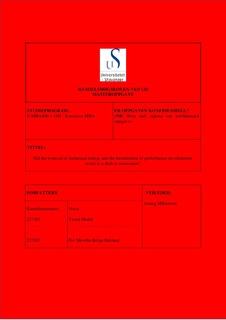Did the removal of numerical ratings and the introduction of performance development, result in a shift in motivation?
Master thesis
Permanent lenke
http://hdl.handle.net/11250/2619928Utgivelsesdato
2019-05-27Metadata
Vis full innførselSamlinger
- Studentoppgaver (Business) [1023]
Sammendrag
The purpose of this study was to determine whether the changes Secreta made to its performance management system had the desired effect. Our research comprised an attempt to answer the following question: Are there any changes in motivation among Secreta’s employees following the shift from performance management with numerical ratings to performance development without numerical ratings?
Our introduction will show that many aspects of performance management have previously been researched. Its primary relevance is that it has a potential impact on all employees and could thus affect both the employees and the organization’s well-being. Previous studies indicate that over the years there has been a change in how performance management is being conducted, from the use of numerical ratings and yearly appraisals to evaluate employees to an emphasis on performance development and continuous feedback. This will be described at length in relation to theory and research. Secreta changed its performance management system in 2018. After many years of using numerical ratings and yearly appraisals, the company now has a focus on development, continuous goal setting and 360-degree feedback in order to enhance performance.
The empirical research of the current study comprised an attempt to evaluate the efficacy of this change. It is linked to relevant theories regarding performance management, performance development, goal theory, appraisal, reward, HRM practice and motivation. We will describe several motivational theories, such as goal theory, appraisal, reward, HRM practice and self-determination theory. These constitute the framework that makes it possible to understand how performance development works and how it can be used to increase performance and motivation in an organization.
To determine where there has been an increase in employee motivation and well-being since the change in performance management systems at Secreta, we gained access to several surveys that the company performs annually. In addition, we conducted in-depth interviews with employees and leaders and with employees who had played relevant roles in the change process. We used the interviews to substantiate the results from the surveys, and to acquire information that the survey results could not provide. Our findings are presented in relation to the relevant theory and duly discussed.
We concluded that the results of the surveys indicated an improvement from 2017 to 2018. The results were generally positive with respect to motivation and well-being. These findings were substantiated by the answers we received when interviewing Secreta employees. Based on those three data sets, we see indications of a positive shift in motivation and well-being following the introduction of performance development without numerical ratings.
Beskrivelse
Executive Master’s thesis in Business Administration

